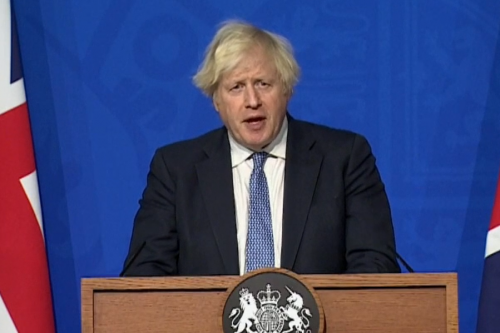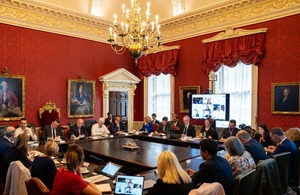Prime Minister Boris Johnson quits

Boris Johnson has today resigned as Prime Minister, although he has said he will stay on until a new Conservative Party leader is chosen.
Speaking outside 10 Downing Street, Johnson said: “It’s painful not to be able to see through so many ideas and projects myself but, as we’ve seen, at Westminster the herd instinct is powerful when the herd moves, it moves.”
Johnson pointedly said that “it is clearly now the will of the parliamentary Conservative Party” that he departs and that he is “sad…to be giving up the best job in the world”.
A timetable for the selection of a new leader will be set out next week.
Johnson has filled Cabinet vacancies that includes Greg Clark becoming Levelling-Up Secretary and James Cleverly as Education Secretary, who replaces Michelle Donelan who resigned after being appointed on Tuesday.
In a rambling, self-congratulatory speech, Johnson said: “I’m immensely proud of the achievements of this Government from getting Brexit done to settling our relations with the continent for over half a century, reclaiming the power for this country to make its own laws in Parliament, getting us all through the pandemic, delivering the fastest vaccine rollout in Europe, the fastest exit from lockdown, and in the last few months, leading the West in standing up to Putin’s aggression in Ukraine.”
Johnson did not reference his handling of the Chris Pincher scandal, nor express any contrition or regrets about any other events under his leadership.
Johnson’s resignation draws a line under a chaotic few days.
Chancellor Rishi Sunak and Health Secretary Sajid Javid quit on Tuesday evening, followed by around 60 Conservative ministers and Parliamentary Private Secretaries.
They included levelling-up ministers Neil O’Brien and Kemi Badenoch, treasury minister John Glen, and housing minister Stuart Andrew as MPs from all sides of the party made their displeasure clear. On Wednesday evening, Levelling Up Minister, Michael Gove, was sensationally sacked.
After trying to hold onto his office throughout Wednesday, Johnson was hit by more resignations on Thursday morning before agreeing to stand down.
Wednesday’s departures came either side of a bruising Prime Minister’s Questions and a statement by Javid to a packed House of Commons in which he encouraged Conservative MPs to force a change of leader.
Javid said: “I have concluded that the problem starts at the top, and I believe that is not going to change. And that means it is for us who have a position of responsibility to make that change.”
Johnson also faced the Liaison Committee in the afternoon where he sought to present a business-as-usual approach while outside the room junior ministers and his authority were ebbing away, and a delegation of senior ministers, reportedly including his new Chancellor Nadhim Zahawi, were preparing to tell him his time was up.
Johnson has been in office for just under three years and large parts of that have been spent surrounded by speculation about his ability to remain as Prime Minister, culminating in last month’s vote of no confidence.
The uncertainty has been despite Johnson leading his party to an unexpected 80-seat majority in December 2019’s general election that was attributed to his personal connection with voters, and his repeated contention that he had “got Brexit done”.
The UK will soon have its fourth Prime Minister in just over six years since the Brexit referendum – a rate of change not seen since the 1970s.
It will also be the first time that one party has provided four consecutive Prime Ministers since Sir Winston Churchill, Sir Anthony Eden, Harold Macmillan and Sir Alec Douglas-Home were in Number 10 between 1951 and 1964.









